Retinol is a form of vitamin A which has been used to treat a variety of skin conditions, including acne, uneven skin tone, hyperpigmentation, lines, wrinkles, etc.
However, despite its many benefits, retinol is known to cause skin irritation and sensitivity and has even been linked to triggering eczema in people who have never had it before.
As someone who’s experienced tretinoin-induced eczema flare-ups before cutting it out of my routine and downgrading to a milder retinoid only for the flare-ups to return after a little while in this article, I will explain everything I know about this occurrence and share my best tips on how to relieve retinoid-induced eczema flare-ups.
But first, let’s start by explaining a little more about eczema since understanding this condition is crucial in managing it.
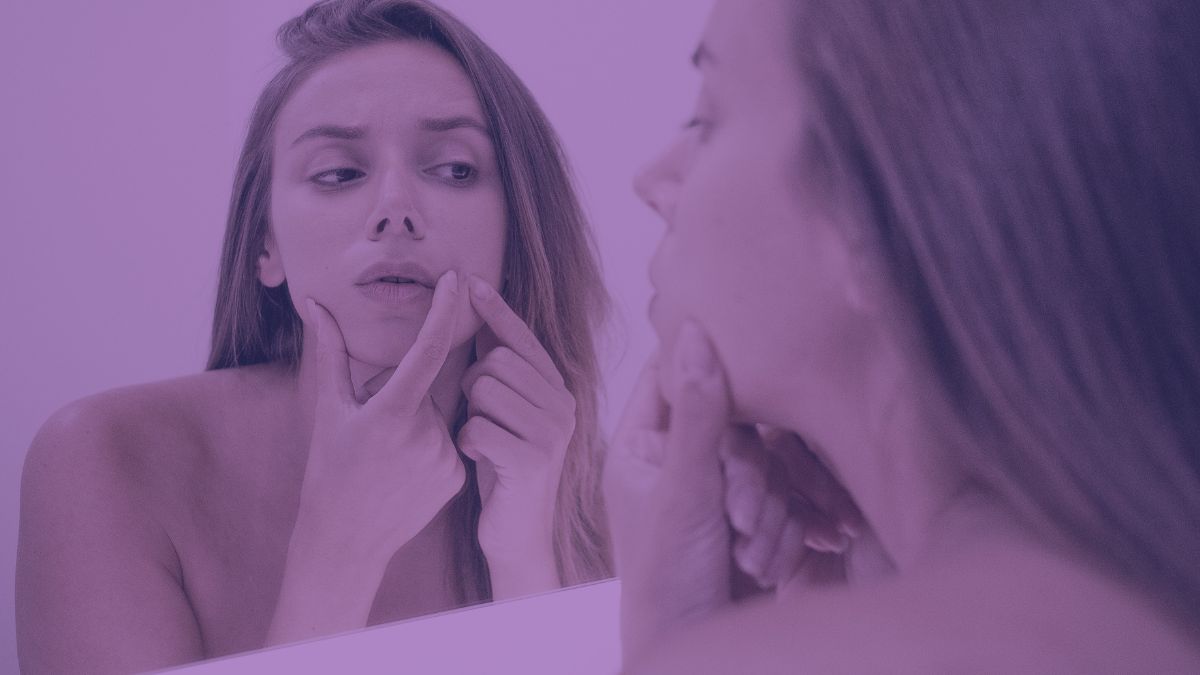
What is Eczema?
Eczema is a term used to describe a group of skin conditions in which the skin is dry, peeling, itchy, and inflamed.
The terms eczema and dermatitis are often used interchangeably; however, ‘dermatitis’ literally means inflammation of the skin, while eczema is a specific type of dermatitis.
From there, eczema can be divided into two groups: atopic and contact (again, often called contact dermatitis.)
Atopic eczema is a condition in which the skin’s natural barrier is weakened, allowing allergens and irritants to penetrate through and cause inflammation.
This type is more common in children and may be triggered by common irritants the child’s skin comes into contact with, including soaps, detergents, shampoos, fabric softeners, etc.
Additionally, atopic dermatitis can also be an internal issue and can manifest when the child’s immune system perceives factors such as cold and dry weather, dust mites, pet fur, pollen, and mold as a threat and reacts with an inflammatory response that manifests on the skin as dry, peeling, and itchy skin.
Contact eczema, or contact dermatitis, on the other hand, is primarily caused by direct skin contact with an allergen or irritant and can occur at any point in your life.
Contact dermatitis is the more superficial issue of the two, and while atopic eczema can be an immune reaction, contact dermatitis is a direct cause and effect that pretty much manifests the same symptoms of dry, peeling, and itchy skin whenever it flares up.
Common triggers of contact dermatitis include latex, adhesives, metals, and certain components such as dyes, fragrances, and preservatives found in cosmetics, soaps, and laundry detergents.
Additionally, contact dermatitis can take a long time to develop and show symptoms; therefore, it doesn’t mean that you will experience a flare-up as soon as you come into contact with a potential irritant.
It’s not unheard of for people who have worked in an industry where they regularly come into contact with metals to develop contact eczema after years of handling them without any issues.
Additionally, it’s also not unheard of for people who have been using the same fabric softener or facial cleanser for a long time to suddenly develop contact eczema after using it previously without any issues.
Therefore, it’s important to pay attention to any potential irritants you come into contact with, and if you do develop a rash, don’t neglect the fact that it may be something that has never irritated you in the past.
Can Retinol Cause Eczema?
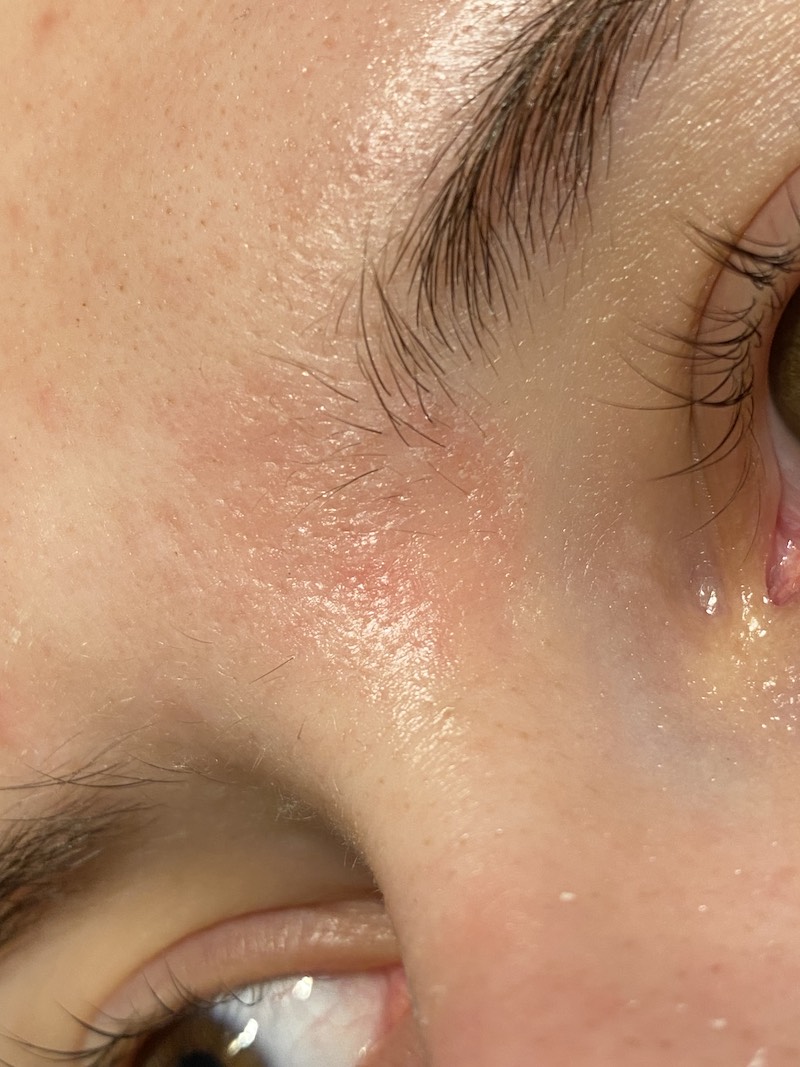
Despite having many beneficial effects on the skin, including stimulating collagen production, increasing cellular turnover, clearing the pores from clogs, reducing acne and inflammation, and fading hyperpigmentation, retinol and its derivatives can cause eczema symptoms that manifest as peeling, shedding, redness, and irritation.
It is hypothesized that cytokines may be important inflammatory mediators in retinoid-induced dermatitis, as some studies suggest retinol stimulation affects the secretion of both pro-inflammatory and anti-inflammatory cytokines.
Cytokines are proteins that are secreted by certain cells of the immune system, and they act as molecules that coordinate communication between cells.
Therefore, it is thought that when applied to the skin, retinol can stimulate the production of cytokines which can lead to inflammation and can manifest on the skin as eczema flare-ups.
These cytokines also tend to increase the permeability of the skin, which can make it more susceptible to being triggered by allergens and irritants.
However, things can be a little complicated with retinol and other vitamin A derivatives, as these components are known to cause initial dryness, redness, peeling, and purging that can last anywhere from four to twelve weeks until the skin adjusts to the new product.
And while this is a normal and temporary reaction to retinol, should these symptoms persist well after the twelve-week mark, this could be a potential sign of eczema.
Therefore, if you have introduced retinol or any vitamin A derivative into your skincare routine, but your skin doesn’t seem to take well to the product for longer than twelve weeks and continues to flare up with symptoms such as dryness, peeling, irritation, and itching that appear as patches in various areas of the face, this is more often than not a sign of eczema.
How to Avoid Eczema Flare-Ups While Using Retinol?
Retinol and its derivatives can be fantastic for the skin, so it can be hard to have to say goodbye to these components, especially if they have helped clear your skin from acne or have visibly improved signs of aging or stubborn hyperpigmentation that has bothered you for a long time.
And while many dermatologists recommend stopping retinoids should symptoms of eczema start to appear, there are ways to continue benefitting from them by being extra careful when using them.
Therefore, if you don’t want to stop using your retinol or another vitamin A derivative, here are some tips that you can follow to help minimize the risk of experiencing eczema flare-ups:
Reduce Retinol Use
If you have successfully built up a tolerance to retinol or vitamin A derivatives, and have started using it every night before the eczema flare-ups started to appear out of nowhere, try to reduce the frequency of use and start using retinol two to three times a week.
Don’t worry about potentially reducing its effectiveness, as once the skin has gotten used to a retinoid and has passed through the initial retinization phase that requires you to use this component more frequently in order to get used to it quicker, you can safely reduce usage without compromising its effects.
Retinoids are extremely effective when it comes to targeting skin concerns such as acne, aging, and hyperpigmentation, and reducing the frequency of use won’t cause these concerns to come back, but it will help reduce the risk of eczema flare-ups.
Don’t Apply Retinol in Areas of Eczema Flare-Ups
Eczema flare-ups on the face usually manifest in areas where the skin is thinner, such as around the eyes and mouth.
Therefore, avoid using retinol in these areas to reduce the risk of uncomfortable flare-ups.
I understand this might not be the ideal way to minimize lines and wrinkles around the eyes and mouth, but this is certainly better than risking a full-blown eczema flare-up that can spread to other areas of the face.
Apply Soothing Ointments Over Eczema Flare-Ups
Before applying a retinoid to your skin, make sure to apply soothing ointment over eczema flare-ups to protect the skin from coming into contact with the component that’s irritating it and reduce irritation and discomfort.
Additionally, retinoids, like any serums or creams, can migrate or spill onto other areas through rubbing, which can cause irritation and discomfort should they come into contact with the irritated area, so this step is vital to make sure your skin stays safe from further harm.
Avoid Using Steroids As Much As You Can
Steroids are the first treatment option given by a dermatologist to soothe eczema flare-ups. However, although very efficient, steroids are not a long-term game, as more and more studies are coming out and warning about the dangers of steroid withdrawal syndrome.
Steroid withdrawal syndrome, or red skin syndrome, is a side effect of steroid overuse where the body becomes dependent on external steroids to function properly, and when these are not introduced in the body regularly anymore, the skin starts to become more irritated and itchy than ever before.
Additionally, steroid withdrawal syndrome is not a condition that’s concentrated in one area, and while you may be given steroids to help soothe a small patch of eczema-affected skin initially, this can result in red skin syndrome developing over your entire body.
Some of the symptoms of steroid withdrawal syndrome are itching, burning, stinging, redness, swelling, and severe peeling that can last for months, if not years, before it improves.
Therefore, if you must use steroids to soothe eczema flare-ups, use them sparingly and only when it is absolutely necessary.
Additionally, you have every right to request a different course of treatment from your dermatologist or doctor if you don’t feel comfortable with the steroids they are prescribing, so don’t feel like you must take them just because they are the go-to option.
Avoid Other Actives
Other active ingredients, such as exfoliating acids being introduced to the mix can also be a potential cause of eczema flare-ups, so if you decide to stick to retinol, make sure to avoid the use of glycolic acid, salicylic acid, lactic acid, etc.
These components encourage the shedding of the outermost layer of the skin, and with this already being compromised due to the presence of eczema, it won’t take much for these components to aggravate it further.
Remember that when your skin is experiencing eczema flare-ups, it is dry and irritated.
So, by removing the outermost layer of the skin, you are removing the dead skin cells that are actually protecting the skin from further harm by holding on to moisture.
Once shed, the moisture will then evaporate, leaving the skin even drier and more irritated than before.
Therefore, avoid using any other actives besides retinoids if you are already experiencing signs of eczema.
Take Vitamin B12
Vitamin B12 or cobalamin is a water-soluble nutrient the body needs in small amounts to function and stay healthy. It is found in liver, meat, eggs, poultry, shellfish, milk, and milk products, but can also be ingested in a supplement form.
Cobalamin helps make red blood cells, DNA, RNA, converts nutrients into energy, and repairs damaged cells and tissues.
Additionally, vitamin B12 can also be efficient in the maintenance of eczema flare-ups, with some studies suggesting that both oral supplementation and topical application have shown to be beneficial in reducing the severity of eczema and other skin conditions.
It is theorized that vitamin B12 causes a decrease in the production of nitric oxide, a pro-inflammatory chemical found in the middle layer of the skin, and subsequently an increase in the production of tissue-repairing proteins.
One particular study that involved an 18-year-old boy affected by severe atopic eczema who previously required continuous topical and oral steroid therapy to achieve satisfactory results, revealed that regular supplementation of oral vitamin B12 reduced the severity of his condition drastically. After a three-year follow-up, an association between vitamin B12 blood levels and atopic eczema severity was detected, meaning the higher the levels of B12 in his blood, the better his skin was.
Additionally, another small study that included 21 participants with various eczema severity resulted in improvement after only four weeks of applying vitamin B12 topically in the form of an ointment.
Therefore, while there is not enough evidence to determine the exact role vitamin B12 plays in eczema, it has been shown to be beneficial in reducing flare-ups when used orally and topically.
Opt for Retinol Alternatives for Eczema-Prone Skin
Finally, if you want to try other options and see if they are more suitable for you, there are retinol alternatives out there that may be more suitable for eczema-prone skin.
It’s worth noting that these alternatives are not as effective as retinol, but they may be less irritating and better tolerated by those with sensitive or eczema-prone and might deliver a satisfactory result for various skin concerns.
Retinol Alternatives for Eczema-Prone Skin
Here are some retinol alternatives that may be more suitable for eczema-prone skin:
Bakuchiol
Bakuchiol is often referred to as the natural alternative to retinol. It is derived from the seeds and leaves of the Psoralea corylifolia plant, and its main active component is referred to as Bakuchiol lactone.
This compound has been tested in various studies and found to be effective in reversing minor signs of aging, UV damage, and cell degradation thanks to its antioxidant properties.
And while bakuchiol certainly won’t deliver the same results as retinol, it is a much gentler option for those with sensitive or eczema-prone skin.
Copper Peptides
Copper peptides are excellent for acne-prone skin, and they have also been found to be beneficial in combating some signs of aging.
These peptides are made up of small molecules that penetrate the skin and promote the production of collagen, elastin, and glycosaminoglycans—all essential components for healthy and youthful-looking skin.
Additionally, copper peptides can also help with inflammation and can also contribute to the normalization of bacterial concentration on the skin, helping to reduce active breakouts, while being much gentler on the skin than retinol and an excellent choice for those with eczema-prone skin.
Arginine
Arginine is an amino acid that has been found to be beneficial for skin health and cell turnover. It can help reduce the appearance of mild wrinkles, fine lines, and other signs of aging.
Arginine is gentle on the skin and can be used by those with sensitive or eczema-prone skin as a milder alternative to retinol.
Niacinamide
Niacinamide is another B vitamin that can be beneficial for those with inflamed, irritated, acneic, and eczema-prone skin.
Niacinamide has been found to improve the skin’s barrier function and reduce inflammation while also helping to normalize sebum production, thus helping to reduce acne breakouts.
Additionally, it can help reduce the appearance of wrinkles and fine lines as well as inhibit the enzyme tyrosinase which can sometimes overproduce the brown pigment melanin as a result of inflammation, causing uneven skin tone and brown spots known as hyperpigmentation.
Finally, niacinamide can also help reduce the appearance of redness by calming the skin and can be a decent alternative to retinol for those with sensitive or eczema-prone skin.
Zinc
Zinc deficiency has been linked to various inflammatory skin conditions and has even been observed that patients with thermal burns become zinc deficient due to exudative losses, increased urinary excretion, and reduction of carrier proteins which results in impaired immunity, wound healing, and glucose control.
Additionally, zinc has been efficient in reducing the severity of some skin conditions such as acne due to its anti-inflammatory properties.
Furthermore, some research has even linked eczema to zinc deficiency, and it has thus been recommended as a treatment for those with eczema-prone skin.
Therefore, whether opting for supplements such as oyster extract that contains a well-rounded blend of essential minerals and vitamins, including zinc, selenium, and B vitamins, or opting for topical creams that contain zinc oxide, this component can be a good alternative to retinol for those with sensitive or eczema-prone skin who are dealing with acne.
Ceramides
Ceramides are lipids and one of the components that naturally form the skin’s barrier and help to lock moisture in, thus protecting it from external aggressors.
Ceramides are known to have strong anti-inflammatory properties and can be beneficial for those with sensitive or eczema-prone skin as well as concerns like acne, aging, and hyperpigmentation.
The reason why ceramides can be so effective in targeting these skin concerns is that they prevent moisture from evaporating and keep it locked inside the skin cells, thus keeping the skin hydrated and balanced.
When the skin is hydrated and balanced, the risk of pathogens that overgrow and trigger inflammatory conditions like acne and eczema is significantly reduced. Additionally, hydrated skin is less likely to exhibit premature signs of aging such as lines and wrinkles.
The Best Products to Soothe Eczema While Using Retinol
If you still want to stick to retinol and its derivatives, tweaking your skincare routine to include more hydrating, soothing, and nourishing products rather than drying, irritating, and damaging ones is definitely a good idea.
This will help mitigate the dryness, irritation, and redness that retinol can bring, thus promoting a healthy skin barrier and less eczema flare-ups.
Therefore, here are some of the best products to help soothe eczema while using retinol:
Vanicream – Gentle Facial Cleanser, $10
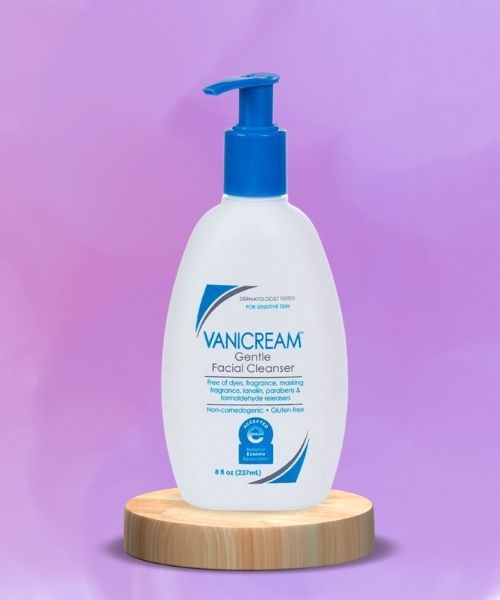
Vanicream Gentle Facial Cleanser is a mild, non-irritating cleanser that helps remove impurities without stripping the skin barrier.
Approved by the National Eczema Association, this gentle cleanser contains no fragrances, dyes, parabens, lanolin, formaldehyde, and other potential triggers.
Southern Natural – Goat Milk Soap Bar with Oatmeal Milk & Honey, $22
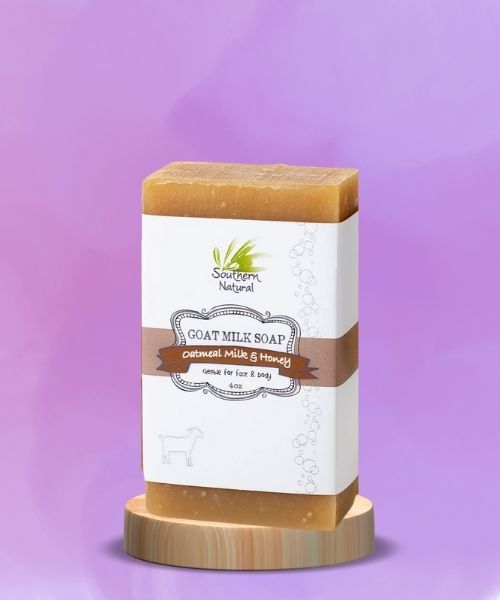
The Southern Natural Soap is made with a blend of goat milk, oatmeal, honey, and other natural oils that help nourish and protect the skin.
Goat milk is known for its hydrating, calming, and anti-inflammatory properties that can help soothe eczema flare-ups and keep the skin moisturized.
However, while this particular soap from the brand is excellent for sensitive, eczema-prone skin, avoid opting for some of their other soaps that contain fragrant components such as lavender and mint as these can sometimes be irritating for those with eczema.
The Honest Company – Eczema Soothing Therapy Cream, $14
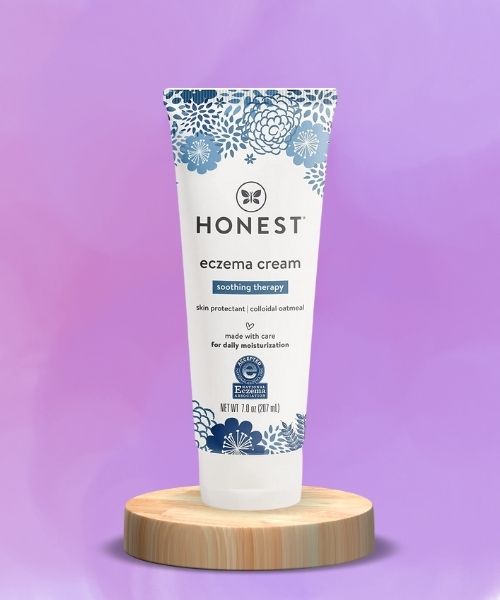
Made with prebiotics, soothing colloidal oatmeal and lots of emollients to keep the skin moisturized and soft, the Honest Eczema Soothing Cream is a great choice for those suffering from eczema.
This cream helps soothe the skin and reduce redness while also strengthening the skin’s protective barrier which helps to lock in moisture and relieve dryness and flare-ups.
La Roche-Posay – Cicaplast Baume B5, $18
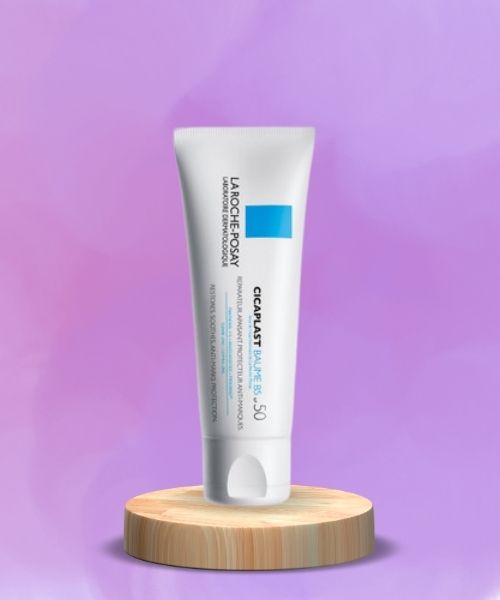
The Cicaplast Baume B5 by La Roche-Posay is a product that delivers immediate relief within seconds of applying it to dry, sensitive, and irritated skin.
It’s a thick balm that contains many soothing, repairing, and moisturizing ingredients, including softening shea butter, hydrating glycerin, soothing and repairing panthenol, nourishing magnesium, anti-inflammatory zinc, as well as Madecassoside, which is one of the four main compounds in the plant extract Centella Asiatica, an incredibly soothing and repairing agent that helps strengthen the skin barrier.
Excellent for those suffering from eczema, this product helps alleviate itching, redness, and other symptoms of the condition while also providing long-lasting hydration.
Bioderma – Cicabio Crème, $16
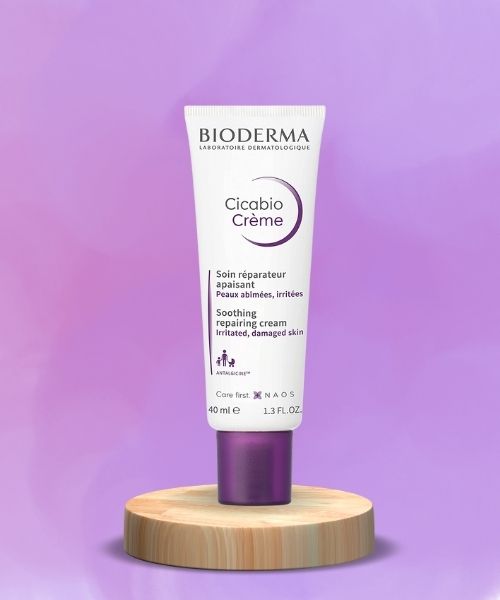
The Bioderma Cicabio Crème is another great product for those suffering from eczema.
Formulated with high concentrations of zinc, copper, and Bioderma’s proprietary ingredient called Antalgicine, the thick, balmy cream quickly relieves the feeling of discomfort and reduces the urge to scratch.
Additionally, its ‘dressing effect’ texture combines hydrating hyaluronic acid, repairing Madecassoside, and antioxidant vitamin E to help soothe eczema flare-ups while promoting healthy skin.
Aveeno – Eczema Therapy Daily Moisturizing Cream, $19
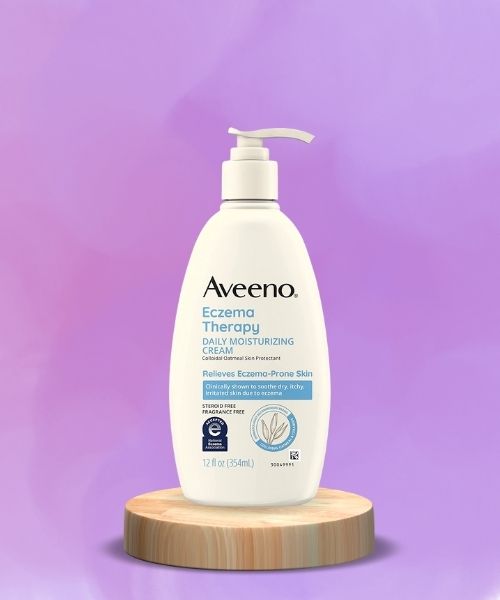
Aveeno’s Eczema Therapy Daily Moisturizing Cream is a steroid-free moisturizer that helps relieve dry, itchy, and irritated skin due to eczema.
Enriched with colloidal oatmeal & ceramides, this fragrance-free cream can be used along with retinol to prevent skin irritation and help keep eczema flare-ups at bay.
Grahams – Eczema Cream, $25
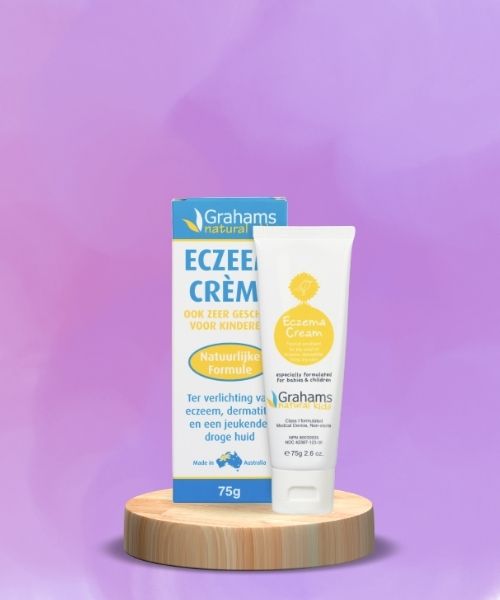
The Grahams Eczema Cream is a balm made with naturally-derived ingredients such as emollients and skin-softening oils and is specifically designed to reduce symptoms of eczema such as dryness, itching, and inflammation.
Suitable for the face and body, this cream helps repair and restore the skin barrier while also providing long-lasting softness and comfort.
However, due to the heavy oils content, the Grahams Eczema Cream might not be the most suitable product for those with acne-prone skin.
Egyptian Magic – All-Purpose Skin Cream, $39
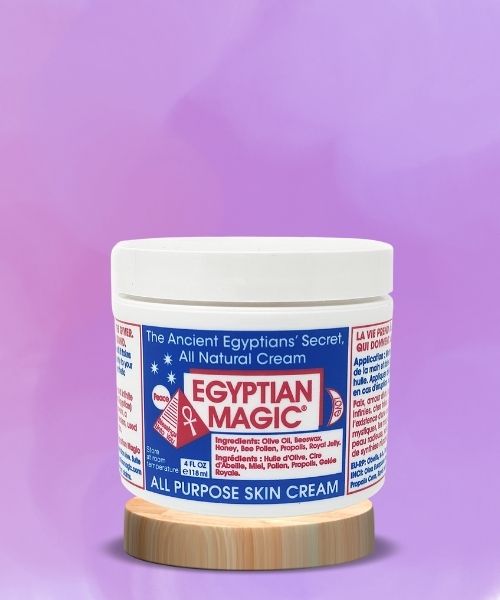
The Egyptian Magic All-Purpose Skin Cream is a heavy emollient-based cream made with six natural ingredients: olive oil, beeswax, honey, royal jelly, bee pollen, and propolis.
Rich in anti-inflammatory agents and antioxidants, this cream helps soothe eczema flare-ups and locks hydration for softer, smoother, and nourished skin.
Dirty Treasures – Organic Colloidal Oatmeal, $25
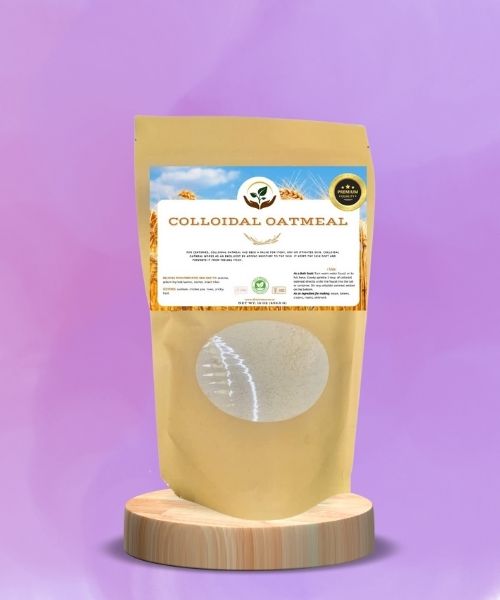
The Dirty Treasures Organic Colloidal Oatmeal is made with 100% organic, extra-finely milled oats which help reduce the itching, redness, and irritation associated with eczema.
Now, I am not big on DIYs, however, when I see something good, I don’t knock it just because I don’t personally believe in most DIYs I see online.
I have to say, this one is a game-changer for those with eczema, and it’s a product that can be used in many different ways, including adding it to the bathtub while you take a bath or mixing it with your favorite moisturizer, body lotion, or even just water if you want to use it as a mask on areas of irritation.
The Better Shea Butter – Zinc Oxide Powder
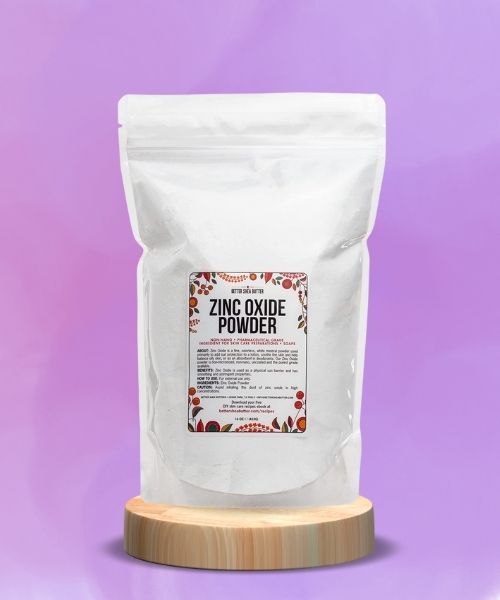
As I already mentioned, zinc oxide is a great anti-inflammatory compound with barrier-repairing properties.
Which is why applying it on the skin in the form of pure powder can be a great way to help reduce itching, redness, and discomfort associated with eczema.
Now, again, I don’t advocate for DIYs, and I agree with the marketing of this product even less.
Their description says that you can use the Zinc Oxide Powder by The Better Shea Butter to make sunscreen at home and that seems pretty hazardous considering how much we know about the dangers of UV radiation.
So, I wouldn’t advise using it as such, however, if you want to use it as a topical ointment or a mask to help reduce eczema flare-ups, then it’s worth giving it a try.

My name is Simone and I am a certified skin specialist. I created this website to teach my readers how to take great care of their skin and I also like to occasionally share my honest opinions on skincare products I’ve tried. You can learn more about me here.
